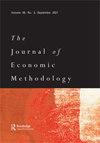Ontological wars in economics: the return of supervenience
IF 1.8
3区 经济学
Q2 ECONOMICS
引用次数: 0
Abstract
ABSTRACTIn this article, I contest Brian Epstein’s argument (2014) against the applicability of global supervenience to relate micro and macroeconomic properties. Epstein rejects supervenience via a causal-chain relation inside the macroeconomic set in his criticism. Accordingly, the rise of the macro set is fixed by a weather event without any mediation from the realm of microeconomics. As it stands, this idea would demonstrate the autonomy of macroeconomics from microeconomics. However, as I intend to argue, in Epstein’s weather-cases scenarios, the corresponding macroeconomic sets are fixed by their micro bases that codify weather events and thereby fix the macro. This is so because the microeconomic base must include institutional facts; they are as much necessary as the facts about people’s conditions. In so doing, we re-establish bottom–top determination from the micro to the macro, rescuing the applicability of global supervenience.KEYWORDS: Supervenience; global supervenience; Kevin Hoover; Brian Epstein; ontology of economics AcknowledgementsI would like to thank Julie Zahle, Matthew Tugby, Nancy Cartwright, and Pedro Garcia Duarte for helpful feedbacks on previous versions of the manuscript. I also must thank both referees for their valuable comments.Disclosure statementNo potential conflict of interest was reported by the author(s).Notes1 See McLaughlin and Bennett (Citation2021).2 Usually, the supervenience’ relata are facts or properties. The concept is not normally employed to relate representational items such as theories or their fragments. Butterfield (Citation2011) has applied the concept to relate different scales of physical theories. In this article, I take as the primary relata of supervenience sets as facts/properties. Along the exposition, these two possible relata are employed interchangeably.3 Peter Kivy (Citation1987) defends a Platonist view of musical works: they are abstract objects (universals, types, or kinds) identical to their sound structures. Their performances are particulars, tokens, or instances. The Platonist view of music is the dominant interpretation about the ontology of music, but there are other interpretations. For an overview, see Kania (Citation2017).4 In The Jazz of Physics, the physicist and jazz musician Stephon Alexander (Citation2016) argues that several symmetries that plays a significant role in quantum mechanics are musically represented in Coltrane’s songs.5 See, Walton (Citation1970).6 Hoover himself did not offer details about emergence. On my view, Hoover bears in mind a weak notion of emergence. Wilson (Citation2021) states two criteria for weak emergence. First, a token higher-level property H is weakly metaphysically emergent from token lower-level property L on a given occasion when (i) H and L are synchronically related and (ii) H has a non-empty proper subset of the token powers had by L. Condition (i) specifies synchronic dependence while (ii) captures a weak sense where an emergent entity E is causally autonomous, and ontologically distinctive from its base entity. This view is, according to Wilson, the proper characterisation of non-reductive physicalism, which indicates why Hoover qualifies his approach to economics as non-reductive strategy.7 Sometimes, institutions may have more pervasive roles instead of merely constraining or enabling behaviour. The constraining role is not the unique feature that institutions may have. About the potential hidden pervasive role of institutions, see Hodgson (Citation2003).8 I would like to thank to one of the referee’s for salienting the consistency between Epstein’s argument and the historical neoclassical microfounded models of 1970s.Additional informationFundingAlexandre Müller Fonseca acknowledges support from the Brazilian Research Council (CAPES, contract number 88881.128923/2016-01)Notes on contributorsAlexandre Müller FonsecaAlexandre Müller Fonseca has recently obtained his Ph.D. degree in Philosophy at Durham University (UK). He is a postdoctoral fellow researcher in economics at Insper (São Paulo, Brazil). His current research focuses on the broader areas of philosophy of economics and the philosophy of social sciences. More particularly, he is interested in various topics related to non-causal and multiple types of inter-level explanations in economics and social sciences, and the explanatory capacity of scientific models, including economics.经济学中的本体论之战:监督的回归
在本文中,我对Brian Epstein(2014)的观点提出质疑,他反对将全球监管与微观和宏观经济属性联系起来。在他的批评中,爱泼斯坦通过宏观经济内部的因果链关系来拒绝监督。因此,宏观集合的上升是由天气事件决定的,没有任何来自微观经济学领域的中介。照目前的情况来看,这一观点将证明宏观经济学独立于微观经济学的自主性。然而,正如我打算论证的那样,在爱泼斯坦的天气案例情景中,相应的宏观经济集合是由它们的微观基础固定的,这些微观基础编纂了天气事件,从而固定了宏观经济。这是因为微观经济基础必须包括制度事实;它们和关于人们状况的事实一样重要。这样,我们从微观到宏观重新建立了自下而上的决定,挽救了全球监管的适用性。关键词:偶然性;全球偶然性;凯文·胡佛;Brian Epstein;我要感谢Julie Zahle、Matthew Tugby、Nancy Cartwright和Pedro Garcia Duarte对以前版本的手稿提供的有益反馈。我还要感谢两位裁判的宝贵意见。披露声明作者未报告潜在的利益冲突。注1参见McLaughlin and Bennett (Citation2021)通常,监督关系是事实或属性。概念通常不用于联系表征项目,如理论或其片段。巴特菲尔德(Citation2011)将这一概念应用于物理理论的不同尺度。在本文中,我把监督集作为事实/属性的主要关系。在整个论述过程中,这两种可能的关系是交替使用的Peter Kivy (Citation1987)为柏拉图主义的音乐作品观点辩护:它们是与它们的声音结构相同的抽象对象(共相、类型或种类)。他们的表演是细节、象征或实例。柏拉图主义的音乐观是对音乐本体论的主要解释,但也有其他的解释。有关概述,请参见Kania (Citation2017)在The Jazz of Physics中,物理学家兼爵士音乐家Stephon Alexander (Citation2016)认为,在量子力学中发挥重要作用的几种对称性在Coltrane的歌曲中得到了音乐上的表现参见,沃尔顿(引文1970)胡佛本人没有提供有关紧急情况的细节。在我看来,胡佛牢记的是一个很弱的涌现概念。Wilson (Citation2021)提出了弱涌现的两个标准。首先,当(i) H和L是同步相关的,并且(ii) H具有L所具有的令牌权力的非空固有子集时,在给定场合下,令牌高级属性H从令牌低级属性L中弱形而上学地涌现出来,条件(i)指定了同步依赖性,而(ii)捕获了一个弱意义,其中一个涌现实体E是因果自治的,并且在本体论上与其基础实体不同。根据威尔逊的说法,这种观点是对非简化物理主义的恰当描述,这也说明了为什么胡佛把他的经济学方法称为非简化策略有时,制度可能具有更广泛的作用,而不仅仅是限制或使行为成为可能。约束作用并不是制度可能具有的唯一特征。关于机构潜在的隐藏的普遍作用,见霍奇森(Citation2003)我要感谢其中一位裁判,他突出了爱泼斯坦的论点与20世纪70年代的历史新古典主义微观模型之间的一致性。alexandre mller Fonseca感谢巴西研究委员会(CAPES,合同编号88881.128923/2016-01)对作者的支持alexandre mller Fonseca最近在英国杜伦大学获得哲学博士学位。他是Insper(巴西圣保罗)的经济学博士后研究员。他目前的研究主要集中在经济哲学和社会科学哲学等更广泛的领域。更具体地说,他对经济学和社会科学中与非因果和多种类型的层次间解释相关的各种主题以及包括经济学在内的科学模型的解释能力感兴趣。
本文章由计算机程序翻译,如有差异,请以英文原文为准。
求助全文
约1分钟内获得全文
求助全文
来源期刊

Journal of Economic Methodology
ECONOMICS-
CiteScore
3.20
自引率
8.30%
发文量
23
期刊介绍:
The Journal of Economic Methodology is a valuable forum which publishes the most current and exciting work in the broad field of economic methodology. The Journal of Economic Methodology addresses issues such as: ■Methodological analysis of the theory and practice of contemporary economics ■Analysis of the methodological implications of new developments in economic theory and practice ■The methodological writings and practice of earlier economic theorists (mainstream or heterodox) ■Research in the philosophical foundations of economics ■Studies in the rhetoric, sociology, or economics of economics
 求助内容:
求助内容: 应助结果提醒方式:
应助结果提醒方式:


